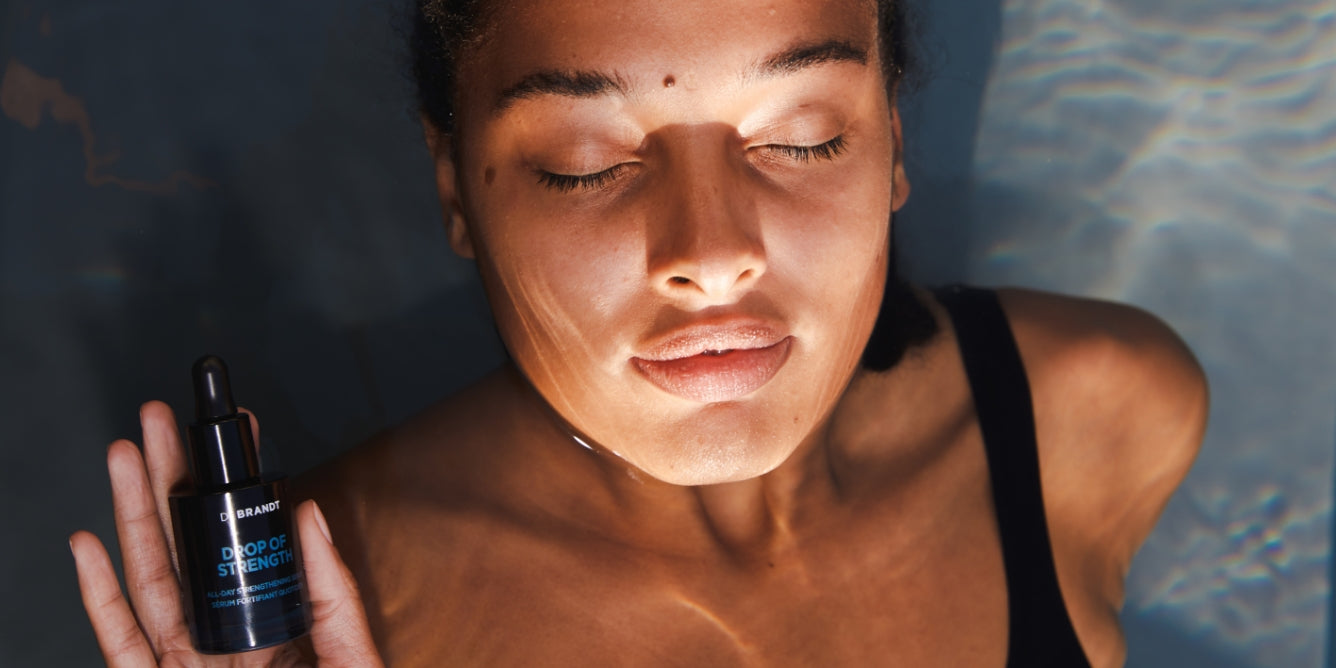
Sensitive skin can be identified by a variety of both visible and non-visible symptoms and over 70% of women and 60% of men report having some degree of sensitive skin. Here, Skin Advisory Board member, Dr. Katlein Franca breaks down what exactly sensitive skin is, what the skin’s reactions are to aggressors, what skincare products you should be using in your routine if you have sensitive skin, and even what ingredients to avoid in order to care for your facial and body skin.
What is sensitive skin?
According to the International Forum for the Study of Itch, sensitive skin is defined as "A syndrome defined by unpleasant sensations (stinging, burning, pain, skin irritation, pruritus, and tingling sensations) in response to stimuli that normally should not provoke such sensations. These unpleasant sensations cannot be explained by lesions attributable to any skin disease. The skin can appear normal or be accompanied by erythema. Sensitive skin can affect all body locations, especially the face". (1)

What causes sensitive skin reactions?
Skin sensitivity happens because of a combination of factors:
- Disruption in skin barrier: The skin barrier, which is the most super superficial layer of the skin, has the function to protect the body from excessive transepidermal water loss as well as to prevent the penetration of compounds into the body via the epidermis. (2) The barrier function is compromised in sensitive skin compared with normal skin allowing allergens and irritants to penetrate the skin.
- Reactivity to irritants: From applying a product too many times, your skin can develop product sensitivity. These symptoms may occur minutes to hours after contact with a cosmetic product or environmental stimulant such as cold, heat, sun, and wind or even after several episodes of use of a topical product, by a cumulative effect. (3)
- Sensorial changes: Involvement of neurons that causes changes in sensations and induce sensitive skin. (4)
How should you choose your skincare if you have sensitive skin?
Gentle cleansing, moisturizing, and protection are the key components of an effective skin care routine for sensitive skin. As a general rule, if you have sensitive skin, it is wise to use skincare products with a limited number of ingredients.
Cleansing:
The choice of a mild cleansing agent is important in the adjunctive management of sensitive skin. Agents with slightly acidic or neutral pH, nonionic surfactants, and minimal skin residue may be preferable for people at increased risk for irritancy reactions. (5)
Check out our cleansers.
Moisturizer:
Proper skin hydration will help to recover and maintain the skin protection barrier and to get rid of dry skin. Options to protect the skin barrier include moisturizers containing glycerin and hyaluronic acid. To prevent transepidermal water loss, favor the use of barrier molecules such as petrolatum and dimethicone. Lipid complexes and ceramides are also good ingredients to strengthen the skin’s barrier function. (6)
Check out our best creams to prevent dry skin.
Sunscreen:
For being relatively inert, safe, stable, and non-irritating, physical sunscreens are particularly useful for patients with sensitive skin. Photoprotection containing titanium dioxide and zinc oxide should be used by patients with sensitive skin since ultraviolet radiation can contribute to the symptoms. (7)
Cosmetics:
Sensitive skin is less tolerant to frequent and prolonged use of cosmetics. Preference should be given for powder over liquid products whenever possible because these, by nature, contain lower amounts of preservatives, and to cosmetics with shorter ingredient lists, fewer preservatives, and that are easily removable with water. (3)

Ingredients to avoid
Skincare product formulations for sensitive skin include products with a paucity of ingredients, absence of common sensitizers and irritants, such as fragrances and masking fragrances, irritating preservatives, alcohol, formaldehyde releasers, among others. Favor fragrance free products
It is also important that these products not contain cutaneous sensory or vasodilatory stimulants, like methanol and camphor. (8)
A Patch Test performed by a dermatologist can help determine the exact ingredients that can trigger or exacerbate your symptoms. After the test, your doctor can advise you on the products you should avoid and favor to manage your sensitive skin.
REFERENCES
1- Misery L, Ständer S, Szepietowski JC, et al. Definition of Sensitive Skin: An Expert Position Paper from the Special Interest Group on Sensitive Skin of the International Forum for the Study of Itch. Acta Derm Venereol. 2017;97(1):4-6. doi:10.2340/00015555-2397
2- Muizzuddin N, Marenus KD, Maes DH. Factors defining sensitive skin and its treatment. Am J Contact Dermat. 1998;9(3):170-175.
3- Duarte I, Silveira JEPS, Hafner MFS, Toyota R, Pedroso DMM. Sensitive skin: review of an ascending concept. An Bras Dermatol. 2017;92(4):521-525. doi:10.1590/abd1806-4841.201756111
4- Ständer S, Schneider SW, Weishaupt C, Luger TA, Misery L. Putative neuronal mechanisms of sensitive skin
5- Bikowski J. The use of cleansers as therapeutic concomitants in various dermatologic disorders. Cutis. 2001;68(5 Suppl):12-19.
6- Rodan K, Fields K, Majewski G, Falla T. Skincare Bootcamp: The Evolving Role of Skincare. Plast Reconstr Surg Glob Open. 2016;4(12 Suppl Anatomy and Safety in Cosmetic Medicine: Cosmetic Bootcamp):e1152. Published 2016 Dec 14. doi:10.1097/GOX.0000000000001152
7- More BD. Physical sunscreens: on the comeback trail. Indian J Dermatol Venereol Leprol. 2007;73(2):80-85. doi:10.4103/0378-6323.31890
8- Draelos ZD. Sensitive skin: perceptions, evaluation, and treatment. Am J Contact Dermat. 1997;8(2):67-78.




Leave a comment (all fields required)